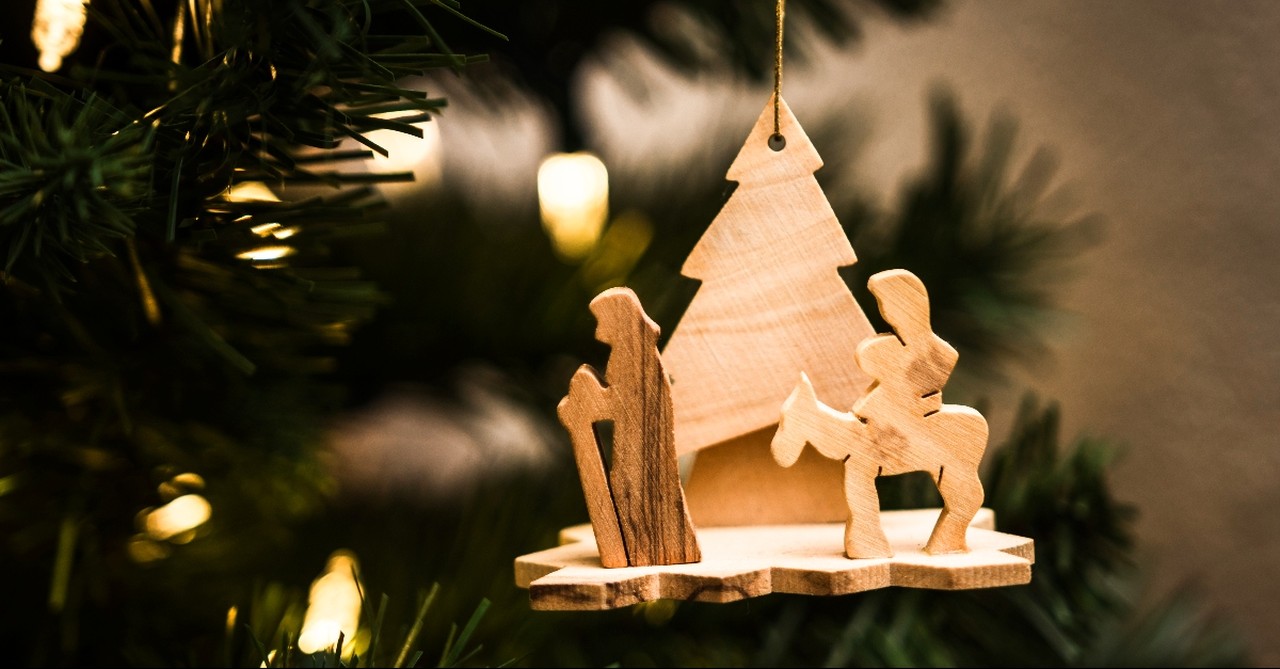This Ask Roger article may feature insights from Roger's wife, Dr. Julie Barrier, co-founder of Preach It, Teach It, worship minister, concert artist, and adjunct professor at Golden Gate Baptist Theological Seminary, or his daughter, Brie Barrier Wetherbee, a sought-after Bible teacher and conference speaker, author, analyst, and Christian theologian.

Dear Roger,
Economists tell us that we are on the verge of a recession. Some say that it’s 50-50 that we will or won’t have one. I’ve noticed that many families who were cutting their expenses last year are in a quandary about how much to spend on Christmas gifts.
For some Americans, this downturn really hurts. Families that cut a little last year are cutting a lot more this year.
One of my friends said to me, “We had a pretty good Christmas last year, but we’re not having Christmas this year. We are not even having gifts for our kids.”
Can you give us some ways we can make Christmas different this year?
Sincerely, Jonathan
Dear Jonathan,
Simply by implementing the following two Proverbs, many of us can make Christmas more meaningful than ever before.
We tend to spend most all of our Christmas giving on ourselves, our friends, and our family. How much different would it be if we looked down the economic ladder and were intentionally generous to help folks that we tend to overlook?
"One man gives freely, yet gains even more; another withholds unduly, but comes to poverty." Proverbs 11:24 NIV
"A generous man will prosper; he who refreshes others will himself be refreshed." Proverbs 11:25 NIV
We must learn to climb now down the ladder of socio-economic status.
Photo Credit: ©GettyImages/maximkabb
What Is Socio-Economic Status?

What Is Socio-Economic Status?
SLIDE 1 OF 5
Socio-economic status is a way of measuring the position of a group or of a person’s standing in society based upon such factors as: income; wealth; amount and kind of education; type and prestige of occupation; place of residence; and, in some societies, ethnic origin.
These class labels are representative of the general approach used in popular language and by researchers.
- Rich
- Upper Middle-Class
- Middle-Class
- Lower Middle-Class
- Poverty Line
Of course, there are multiple sub-strata within each major socio-economic status level.
Who Is on the Ladder, and Where Are They?
People in differing status levels tend to congregate in different ways.
For example, consider how they congregate at the football stadium on Sunday afternoon.
First of all, some are not there. They can’t afford a ticket.
Second, most of the stadium is filled with middle-class and upper-middle-class people. They like to congregate in groups and enjoy being part of the crowd.
Third, rich people are nowhere to be seen. They are going up in private elevators to the sky boxes at the very top of the stadium. They like to congregate in small groups of five to ten people. They don’t like to associate with people below their socio-economic status.
The lower-middle class and poverty-level people are drinking cheap wine at home. The middle-class people are drinking beer, while the rich are sipping martinis.
Those in the middle are much more trusting than those in the other two major status groupings.
Those under the poverty line have been stepped on so many times in so many ways that they just wait for the next “shoe to fall.” The rich and very rich are of the opinion that they and they alone can make the decisions that will bring success and victory to their lives.
All the while, those in the middle class sit at their desks working in a large company and believe that somebody, somewhere out there, is in control. They are not.
Photo Credit: © Getty Images/Kerkez
The Ladder Differs from Culture to Culture

The Ladder Differs from Culture to Culture
SLIDE 2 OF 5
If you own an old clunker car in Africa, you may be considered rich.
However, you can be a single mom on minimum wage with two children and no child support in America and drive an old car in constant need of repair, and no one would call you rich.
We tend to look up the ladder and compare ourselves with those above us.
In America, we seldom consider ourselves to be rich. Someone is always higher up the ladder than we are. We compare ourselves with those above and think, “I’m not rich! Those above me are the ones who are rich!”
We don’t look down the ladder very often. If only we would look down the ladder and see how many are below us, we would begin to see how rich we really are. However, it’s hard to look down the ladder.
When I began pastoring my first church, Julie and I lived just below the poverty line. The church promised to pay me $1000 a month. Right after we arrived, the head deacon pulled me aside to tell me that they had made a mistake and could only afford to pay me $900 per month. Fortunately, over the years, God has allowed Julie and me to climb up the ladder.
Once we have climbed up the ladder, it is really difficult to climb back down.
We tend to say, “I can climb down the ladder. I know what it’s like. I once was down there.” The key word is “once was.” It is easy to go up. It is hard to climb back down.
One Sunday, after preaching four sermons on giving, my youngest daughter Bronwyn challenged me to take $25 and go with her to the park where the homeless often congregated. She said, “Take the $25 and go feed them.”
I’d never done this. So, I got some baloney and bread, mayonnaise, Gatorade, candy bars, and sandwich bags and set out to feed the poor. I completed my distribution in about 15 minutes.
“Why so fast?” Bronwyn asked. “Did you take time to talk to them? I’m sure they appreciated the food but what they really want is someone to talk to. They’re very lonely.”
So, I talked with a few and departed as soon as I could extricate myself. I was ready to go home. I was condescending and selfish.
Photo Credit: ©iStock/Getty Images Plus/498770312
It’s One Thing to Climb the Ladder, It’s Another to Try to Come Down

It’s One Thing to Climb the Ladder, It’s Another to Try to Come Down
SLIDE 3 OF 5
Bronwyn did it again the next Sunday. I had done the feeding gig. It was time to try something new. I was stymied. Finally, we entered a thrift store and I saw a mom buying used toys for her children! “Aha,” I thought, “this should do it.”
“May I buy those toys for you?” I asked.
The woman was indignant. She literally scolded me. “I’m a schoolteacher, and I don’t need or want your handouts.”
Bronwyn said, “You aren’t very good at this, are you?”
It’s hard to go back to a diet of Ramen noodles two or three meals a day when you’ve gone up the ladder and are enjoying steak and potatoes, fish, chicken, salad, and dessert!
It’s easy to go up the ladder. It’s hard to go back down.
People at the Bottom of the Ladder Tend to Give Much More Generously
Billionaire Jeff Bezos gave $100 million to Dolly Parton to use at her discretion for charity. Parton has given millions over decades to educate the poor, for disaster relief, and to help children learn to read. Why is Dolly Parton so generous? Because she grew up in poverty.
The poor help the poor because they know what poverty is like.
The most generous givers are in the $10,000 to $23,000 bracket. They give 18% to charity.
Those in the over $100,000 bracket give less than 1.5 % to charity.
Oil billionaire J. Paul Getty was so stingy he installed pay phones in his homes so he wouldn't be charged for long-distance calls. His grandson was kidnapped. Getty refused to pay the ransom.
Why Do Some People Give So Little?
Take a look at this simple list:
They have not fully surrendered themselves to Jesus Christ.
They are still spiritual babies.
Instead of trusting God, they are afraid that they won’t have enough.
They are greedy.
They are trapped in materialism.
They have gone up the ladder and forgotten what it was like at the bottom of the ladder.
It is hard to give "down the ladder" because we don’t know anyone who is poorer than we are.
The Apostle Paul challenged the Corinthian church to give generously by comparing them to the Macedonian church. Imagine what that sermon must have been like! He declared,
We want you to know about the grace that God has given the Macedonian churches. In the midst of a very severe trial, their overflowing joy and their extreme poverty welled up in rich generosity. For I testify that they gave as much as they were able, and even beyond their ability. Entirely on their own, they urgently pleaded with us for the privilege of sharing in this service to the Lord’s people. And they exceeded our expectations: They gave themselves first of all to the Lord, and then by the will of God also to us. (2 Corinthians 8:1-5)
Notice that the Macedonians had been through suffering. They knew extreme poverty… and they gave with extreme generosity. Paul challenged the Corinthian church to do more.
Photo Credit: ©iStock/Getty Images Plus/Anna Ostanina
Why Do Some Give So Much?

Why Do Some Give So Much?
SLIDE 4 OF 5
They look down and see Jesus far down the ladder. They follow him down. They experienced the grace of giving as they watched Jesus climb down the ladder.
How can we be like Jesus? Don’t just look down the ladder; climb down.
"For you know the grace of our Lord Jesus Christ, that though he was rich, yet for your sakes he became poor, so that you through his poverty might become rich." (2 Corinthians 8:9 NIV)
Think of where Jesus was. Then think about where he went. He was living a glorious life in heaven. Think of the richness of Christ: The whole universe was His. He had only to speak one word and a new world would be created. He could put His finger on every star and say, "Mine!"
Jesus Christ was rich in honor and love. Think of the multitude of heavenly hosts that bowed before him in praise and adoration. Isaiah saw the Lord sitting upon the throne high and lifted up, and the cherubim and seraphim in worship and adoration around Him. Can you see how the angels followed Him as far as they could into outer space, and even into the sky around us, crying, "Glory to God in the highest, peace on earth, good will to men"?
Yet, in spite of all this, he became poor. He climbed down the ladder from heaven to earth. The King of glory had to say, "Foxes have holes, bird have nests; but, I have nowhere to lay My head" (Matthew 8:20 NIV).
Jesus had been honored by the "Hallelujahs!" of heaven, and all the courts of glory had shouted His praise. Then, He was spat upon, struck, and cursed.
He was put on a cross to bleed and die… in the ultimate act of generosity.
Look Down the Ladder and Give Accordingly
What if you don’t have very much at all? What if you are at the bottom of the ladder?
You are a single mom, or your husband is not a Christian and does not want you to give to the Lord?
"For if the willingness is there, the gift is acceptable according to what one has, not according to what he does not have." (2 Corinthians 8:12 NIV)
God sees the "heart gift" and not the "hand gift." If the heart wanted to give more but was unable to do so, God sees it and records it accordingly.
Photo Credit: ©Getty Images/Choreograph
A Different Christmas

A Different Christmas
SLIDE 5 OF 5
To practice looking down the ladder, I’m going to encourage you to consider living differently by doing Christmas differently this year. Typically, Christmas is the time when we amp up our consumerism even more, buying a bunch of things for each other to celebrate Jesus’ birthday.
Often we even say, “Oh, I hate buying for him or her. They are so hard to buy for.”
Why? Because they already have everything they need, and if they need something they just get it. So why are we buying something else?
Sit down with your family, and decide how much to spend on each family member.
Don’t spend it all on yourselves: give to someone in need.
We decided to adopt a child from WorldVision for each of our children when they were young. They wrote them letters and sent them gifts. You could participate in Operation Christmas Child with your family. Pack Christmas boxes. Shop for the impoverished children overseas. Gather with friends and family to mail these “treasures” together.
We have someone who helps us with housework. We looked down the ladder and gave her money to buy all of her Christmas gifts for her children.
You can even include your children and grandchildren in the conversation. Let them decide how much to enjoy themselves and how much to give. For your friends, your spouse, get creative and spend less so that you can give more.
Every Christmas we take an out-of-control consumer culture and get all hyped up in our spending, then we crash financially in January. Let’s do this Christmas differently.
At the Jewish Feast of Purim, there is a regulation which says that, however poor a man is, he must find someone poorer than himself and give him a gift.
Let me encourage you to make this Christmas like the Feast of Purim. Find someone who is less fortunate and help them. Be like Jesus and climb down the ladder.
Love, Roger
Photo Credit: ©iStock/Getty Images Plus/Brett Taylor

Originally published December 17, 2024.







